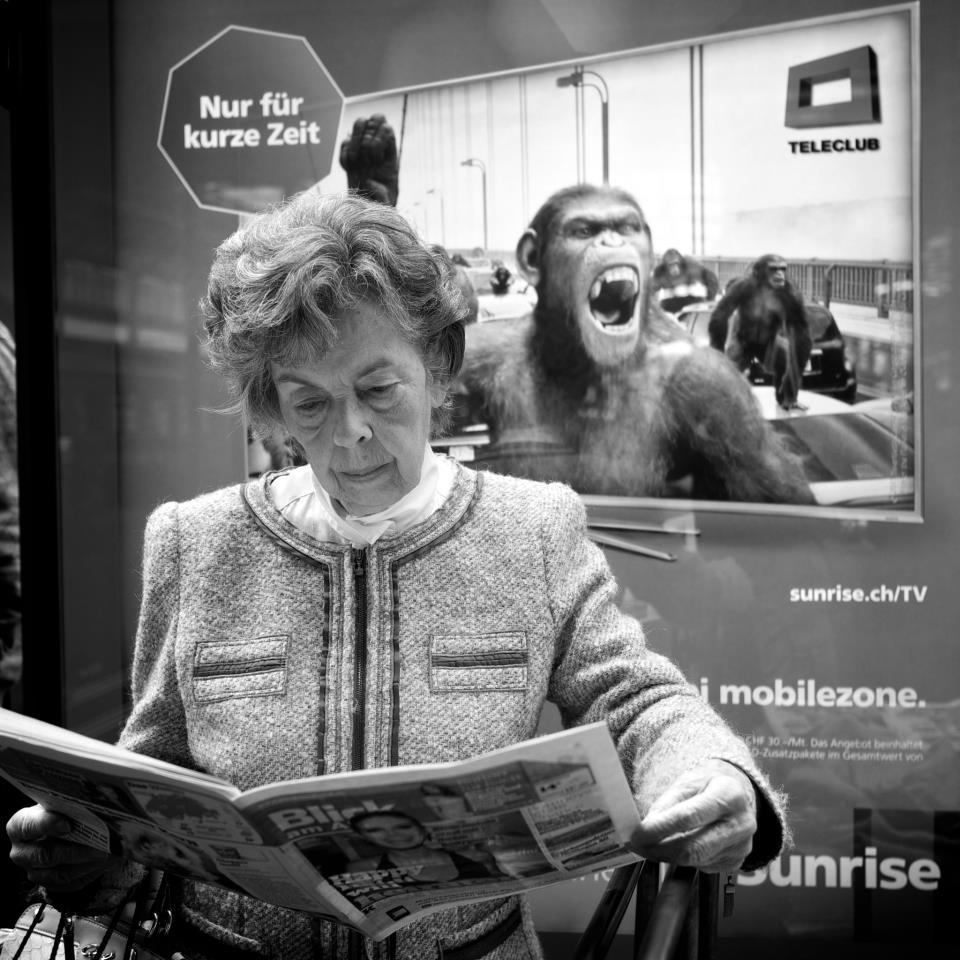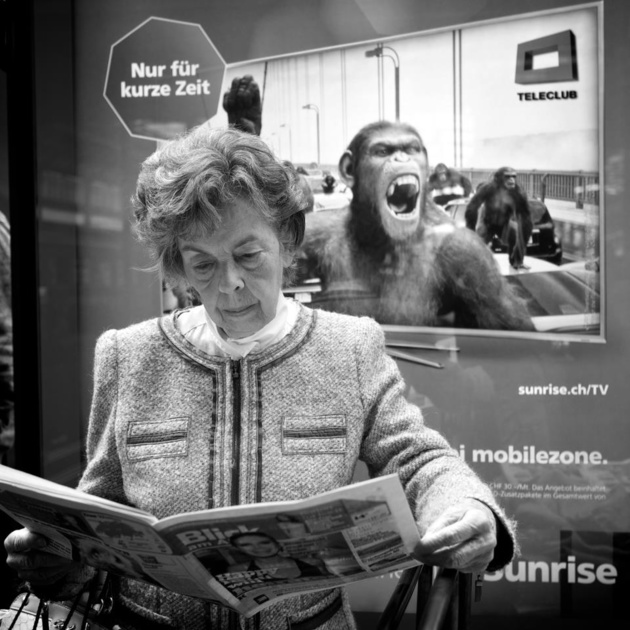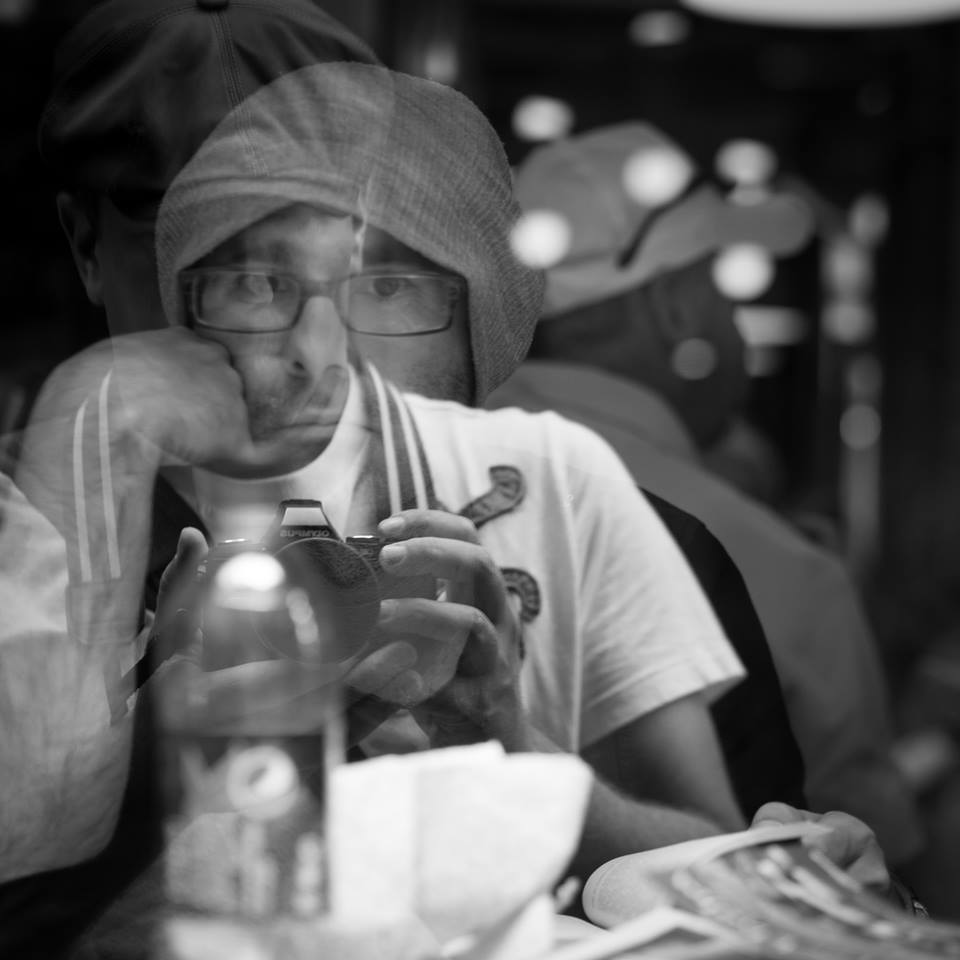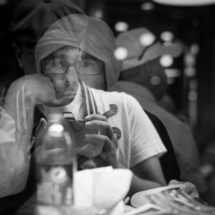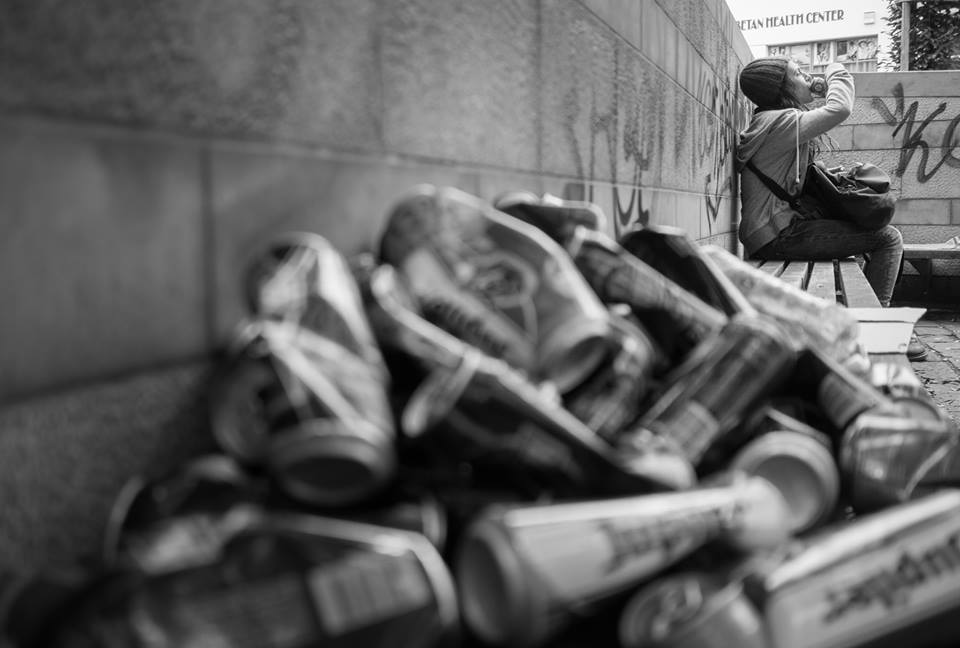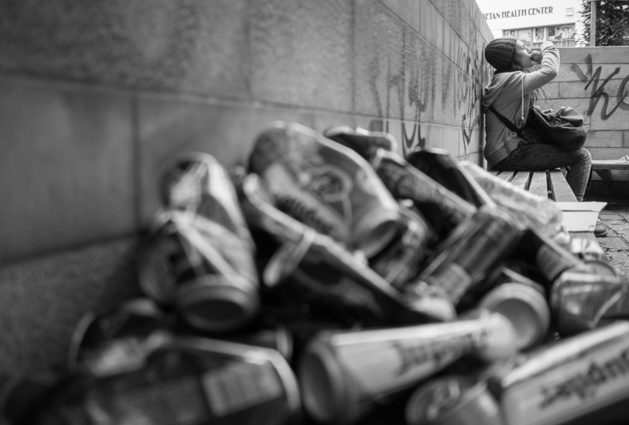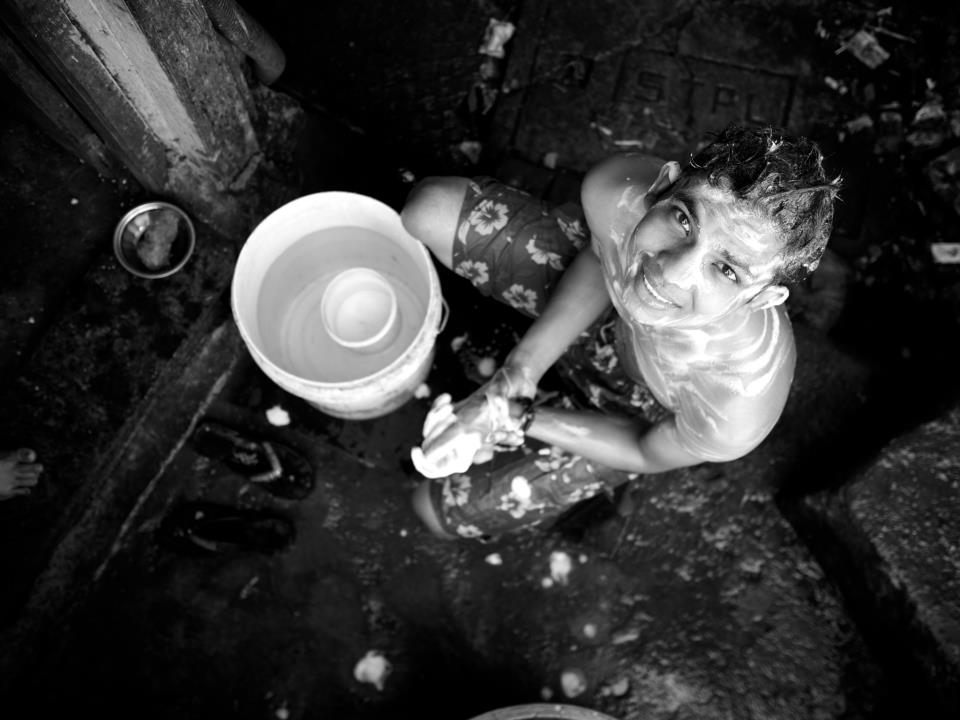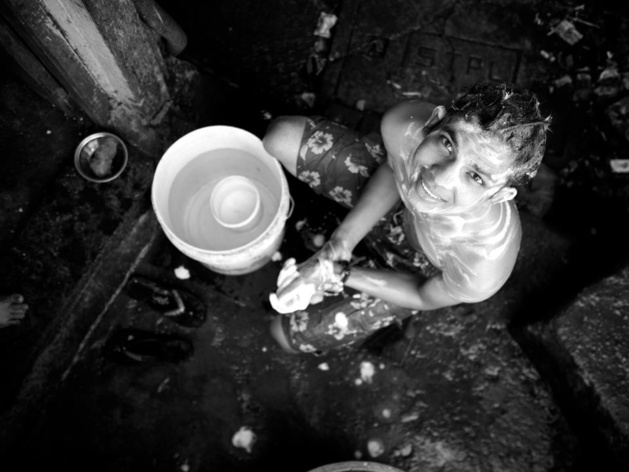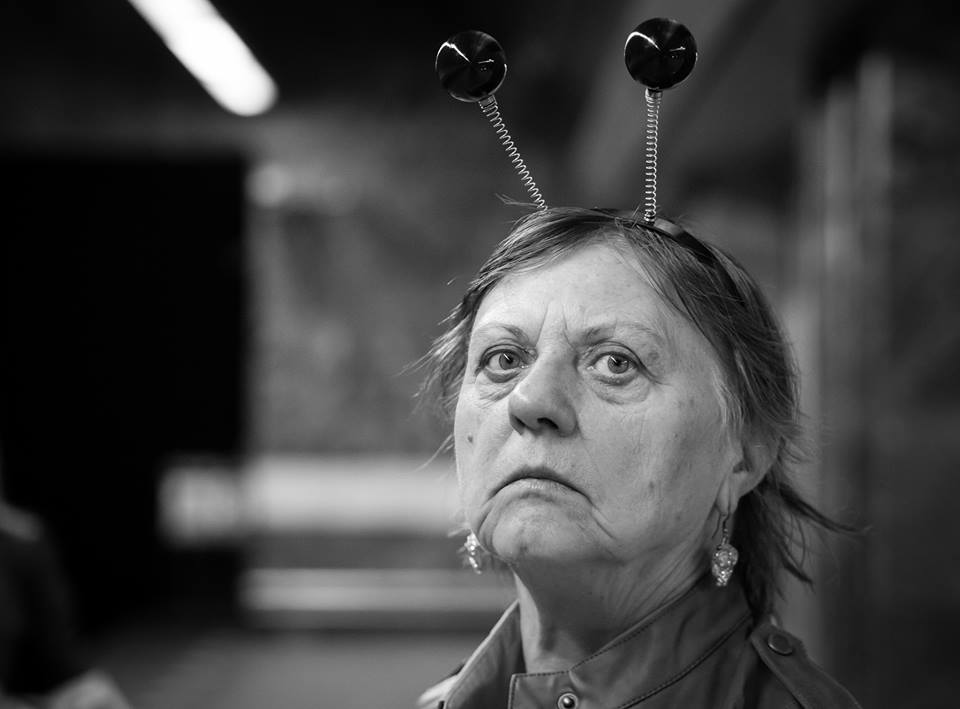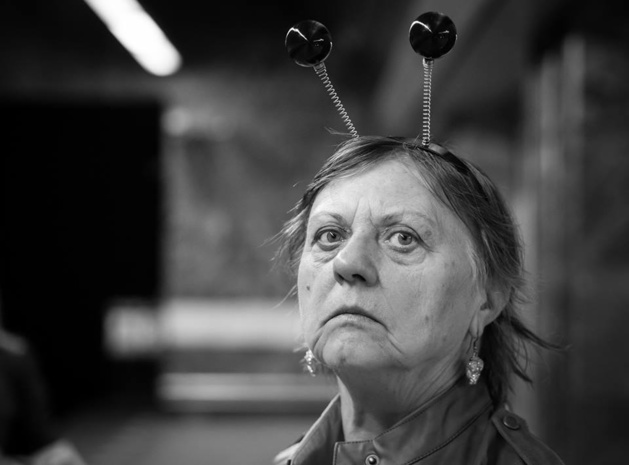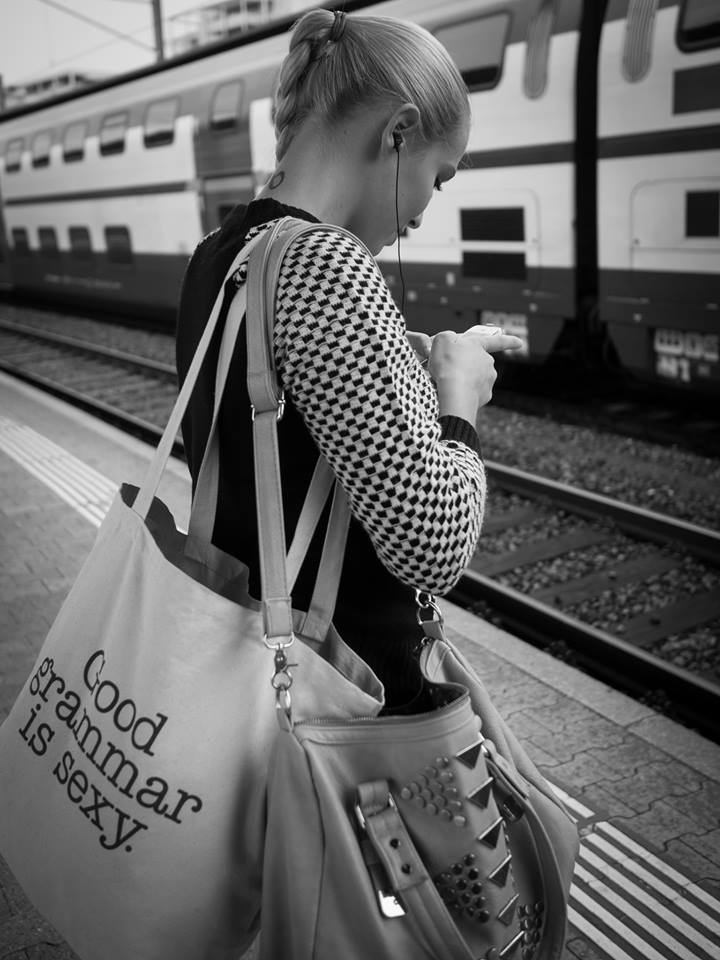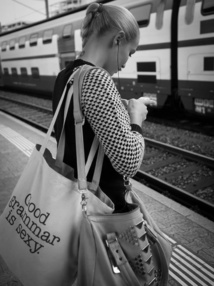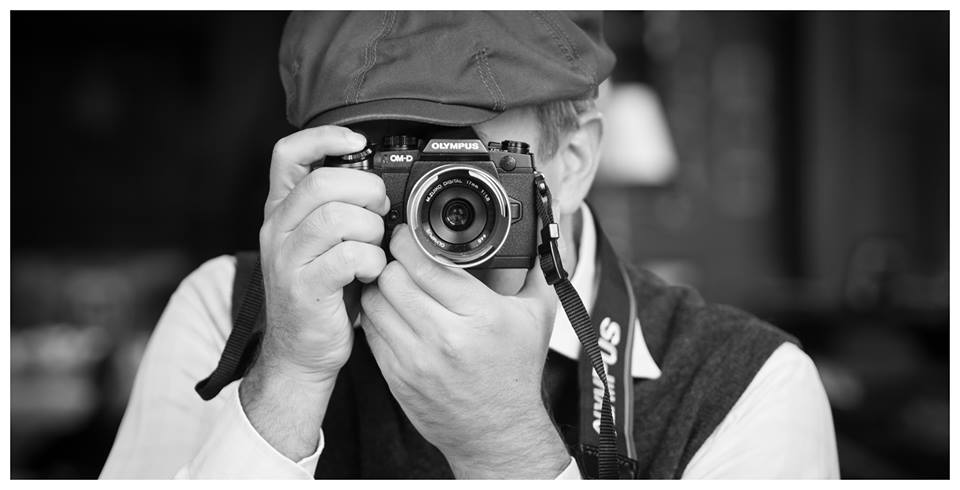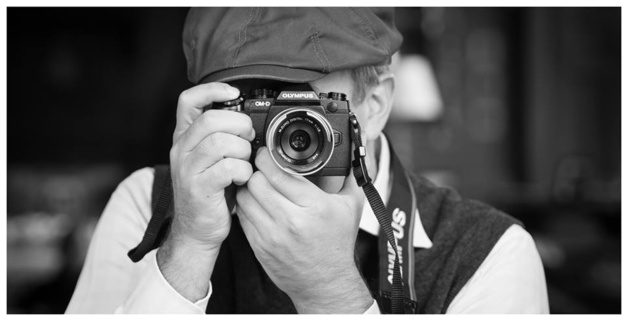"Street photographs” : these words represent your work. What do you particularly like about this place, the street?
There are several reasons, why I like the place they call the street. First of all, it's available everywhere and nearly all the time. In a public place you can find always people which are interesting or that act as a part of my photographs. Another reason is that it is completely free, as long as you have a camera. The street is my studio, the pedestrians are my models and the sun is my light source. Street photography is probably the easiest way of photographing people from a logistics perspective, but one of the most difficult from a technical one.
There are several reasons, why I like the place they call the street. First of all, it's available everywhere and nearly all the time. In a public place you can find always people which are interesting or that act as a part of my photographs. Another reason is that it is completely free, as long as you have a camera. The street is my studio, the pedestrians are my models and the sun is my light source. Street photography is probably the easiest way of photographing people from a logistics perspective, but one of the most difficult from a technical one.
How did this passion for photography come to you?
This is a question I asked myself already several times. I would say that I'm a very curious person and that I want to see and know things in the greatest detail possible. I soon realized that classic fashion photography and portraiture was not my thing and that I want to capture the real moments of life, which are not wearing make-up and which are not staged. After a trip to Beijing to the Olympics in Summer 2008 I was infected by the life on the streets.
There’s something particular you do with your photographs: you share all of them, on your website, Flickr or even on Facebook. It’s a real chance for everyone who wants to discover your work. How do you explain this intention to share and offer your photographs and, after all, share your life and passion?
This answer is as simple as the way I share them. If I would share it with my friends and family, about 100 people would see my work. If I share it on the Internet there are probably hundreds of thousands of people that are able to look see it. And since I share them in the highest possible quality for free, this amount will increase day by day. For me sharing for free is as important as to produce new photographs as often as possible
When I was preparing this interview, I read in several articles that you were not, “properly speaking”, a professional photographer: you don’t live on your passion, but you live for it, is that right?
Yes, this is fully right. I don't live on my passion; I just live for it. I have 90% job in IT working for the local government administration. This job gives me enough time and resources to follow my passion. If I would have to take photographs for a living, it would not be the same. I can leave work at noon on a Friday heading to the airport, knowing that I will spend the weekend in an interesting city, where I can shoot, meet other photographers, eat good food and have fun. And if there would be no single photograph taken, it wouldn't matter at all, as long as I have fun. This feeling of creative freedom is priceless and I would never trade that for a job in photography.
This is a question I asked myself already several times. I would say that I'm a very curious person and that I want to see and know things in the greatest detail possible. I soon realized that classic fashion photography and portraiture was not my thing and that I want to capture the real moments of life, which are not wearing make-up and which are not staged. After a trip to Beijing to the Olympics in Summer 2008 I was infected by the life on the streets.
There’s something particular you do with your photographs: you share all of them, on your website, Flickr or even on Facebook. It’s a real chance for everyone who wants to discover your work. How do you explain this intention to share and offer your photographs and, after all, share your life and passion?
This answer is as simple as the way I share them. If I would share it with my friends and family, about 100 people would see my work. If I share it on the Internet there are probably hundreds of thousands of people that are able to look see it. And since I share them in the highest possible quality for free, this amount will increase day by day. For me sharing for free is as important as to produce new photographs as often as possible
When I was preparing this interview, I read in several articles that you were not, “properly speaking”, a professional photographer: you don’t live on your passion, but you live for it, is that right?
Yes, this is fully right. I don't live on my passion; I just live for it. I have 90% job in IT working for the local government administration. This job gives me enough time and resources to follow my passion. If I would have to take photographs for a living, it would not be the same. I can leave work at noon on a Friday heading to the airport, knowing that I will spend the weekend in an interesting city, where I can shoot, meet other photographers, eat good food and have fun. And if there would be no single photograph taken, it wouldn't matter at all, as long as I have fun. This feeling of creative freedom is priceless and I would never trade that for a job in photography.
More surprisingly you share your experience through the publication of a trio of free books in which you present - in a very philosophical and technical way - your passion for street photography. These books are full of judicious and relevant examples. Can we ask you why you wrote these books and why you chose to give them away for free?
I started to write a small blog about street photography with a weekly topic. After some articles, a friend from Beirut, Lebanon suggested that I should write a book. I was unsure if this would make sense and thought that it would be too much effort, but then I started to write and published my first eBook shortly there after. It was a good decision but the best decision was to publish it for free. I know how hard the music and film industry fights against piracy with only little success. An eBook which can be sent around by email will be bought once and shared often. Giving it away for free makes it available to everyone, from the Leica photographer in NYC to the art student in Mumbai using a borrowed film camera from university. Street photography should be available and affordable to anyone around the globe for free.
If you were to give any advice to a novice photographer, what would it be?
Stop reading books and start shooting as often as you can. Only by performing an activity for 10'000 hours do you become a master, based on the book "Outliers" by Malcom Gladwell. I see too many people not following this simple rule and therefore failing. "It's not your camera, it's your stamina." which makes you successful in street photography.
I started to write a small blog about street photography with a weekly topic. After some articles, a friend from Beirut, Lebanon suggested that I should write a book. I was unsure if this would make sense and thought that it would be too much effort, but then I started to write and published my first eBook shortly there after. It was a good decision but the best decision was to publish it for free. I know how hard the music and film industry fights against piracy with only little success. An eBook which can be sent around by email will be bought once and shared often. Giving it away for free makes it available to everyone, from the Leica photographer in NYC to the art student in Mumbai using a borrowed film camera from university. Street photography should be available and affordable to anyone around the globe for free.
If you were to give any advice to a novice photographer, what would it be?
Stop reading books and start shooting as often as you can. Only by performing an activity for 10'000 hours do you become a master, based on the book "Outliers" by Malcom Gladwell. I see too many people not following this simple rule and therefore failing. "It's not your camera, it's your stamina." which makes you successful in street photography.
You also have the chance to roam the globe and the talent to immortalize street scenes you see with your own eyes. But behind the final picture, how do you see the world? Beyond the picture, are there any moments, events which marked you more than any other encounters?
Since I have the privilege to travel the world with my camera, my view has changed a lot. I have realized that I own too many things, that there are so many people who have everything and still complain how badly they do. I have seen more smiling faces in the deepest slums of Mumbai than on the main shopping street in Zurich, where people would be known to be rich and have everything. Especially the hospitality to a complete stranger is often unbelievable compared to the place where I come from. All these experiences have changed my life and will keep changing it. I suggest to everyone to go out and look at the people, smile at them and even talk to them. You can learn more by walking down the street than in any classroom.
Most of the photographs are in black and white. It is almost as if places were similar, while you travelled the world. Was it intentional?
I know that people expect a colorful photo when you travel to India. I don't say that color is not working for me, but I have learned that color will very seldom add anything to a photograph. Most of the time the strong colors of the today's street are more disturbing that helping. Therefore I have decided not to shoot in color, except when there are really helping the composition or the content. Without color there are just forms, patterns, shades and most importantly emotions.
Since I have the privilege to travel the world with my camera, my view has changed a lot. I have realized that I own too many things, that there are so many people who have everything and still complain how badly they do. I have seen more smiling faces in the deepest slums of Mumbai than on the main shopping street in Zurich, where people would be known to be rich and have everything. Especially the hospitality to a complete stranger is often unbelievable compared to the place where I come from. All these experiences have changed my life and will keep changing it. I suggest to everyone to go out and look at the people, smile at them and even talk to them. You can learn more by walking down the street than in any classroom.
Most of the photographs are in black and white. It is almost as if places were similar, while you travelled the world. Was it intentional?
I know that people expect a colorful photo when you travel to India. I don't say that color is not working for me, but I have learned that color will very seldom add anything to a photograph. Most of the time the strong colors of the today's street are more disturbing that helping. Therefore I have decided not to shoot in color, except when there are really helping the composition or the content. Without color there are just forms, patterns, shades and most importantly emotions.
Why is portrait photography important for you?
Well, my curiosity about the people doesn't stop at 30 feet. I have to go close, I want to see people's eyes and my photography often ends at a very close portrait. I know that portraits are not often telling the same story as a full scene, as you don't see what the person is doing, what the person is wearing, in which place the photo was taken and so on. But for me this doesn't matter. I have to get close and I have to fill the frame. It's a natural impulse to see all the details of a person's face.
Well, my curiosity about the people doesn't stop at 30 feet. I have to go close, I want to see people's eyes and my photography often ends at a very close portrait. I know that portraits are not often telling the same story as a full scene, as you don't see what the person is doing, what the person is wearing, in which place the photo was taken and so on. But for me this doesn't matter. I have to get close and I have to fill the frame. It's a natural impulse to see all the details of a person's face.
You wrote « Street photography is like a box of chocolates. You never know what you're gonna get ». To you, is the street an inexhaustible source of different faces and moments of life?
When I wrote this quote, I would have said yes. Today I would still say yes, but you will get a lot of redundant motives and situations. Like a man reading a newspaper looks more or less the same in all the cities of the world. Of course with some environment in the frame it can be more interesting. What I want to say is that it gets harder with every photo you take to get new ideas, to find new scenes and to keep your photos interesting. I still believe that street photography is more fruitful over time than any other genre of photography.
Eventually, could your philosophy be summed up by the sentence: "nothing should be concealed"?
Yes, this describes it pretty well. I strongly believe that the more you give the more you get back. I never had bad experiences with this philosophy. Most of the time people don't understand why someone could give away his work for free. Maybe one day they will figure out that the best work never was and never will be done for money and that living a passion gives you more satisfaction than the money you could earn with it.
When I wrote this quote, I would have said yes. Today I would still say yes, but you will get a lot of redundant motives and situations. Like a man reading a newspaper looks more or less the same in all the cities of the world. Of course with some environment in the frame it can be more interesting. What I want to say is that it gets harder with every photo you take to get new ideas, to find new scenes and to keep your photos interesting. I still believe that street photography is more fruitful over time than any other genre of photography.
Eventually, could your philosophy be summed up by the sentence: "nothing should be concealed"?
Yes, this describes it pretty well. I strongly believe that the more you give the more you get back. I never had bad experiences with this philosophy. Most of the time people don't understand why someone could give away his work for free. Maybe one day they will figure out that the best work never was and never will be done for money and that living a passion gives you more satisfaction than the money you could earn with it.
Review of Camille Grange, Kayla De Nardi and Maxence Salendre.














